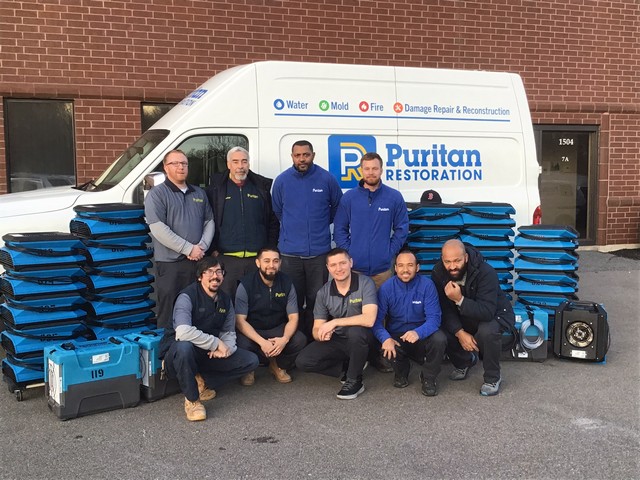Top 9 Hidden Home Dangers!

Top 9 Hidden Home Dangers!
Consumers buy insurance to protect their homes and businesses from theft, flooding, fire, and other potential hazards.
At Puritan Restoration , we deal with insurance claims on a daily basis.
For 40 years we have been helping home and business owners with their water/flood damage and fire/smoke damage claims. We are a full service restoration contractor serving Norwood, Newton, Framingham, Cambridge, Needham, Brookline MA and surrounding areas. Please call us 617-527-2229, if you have questions or send us an e-mail.
Our owners, Paul and Chris Daniele, are passionate about customer satisfaction. Puritan Restoration has strong ties in the Boston community and many satisfied customers, including The Mass Horticulture Society’s Library, The Ritz Carlton Residences, Google, Bose, and Brigs LLC. Recently, one of our long time customers, Adam Williams of Paradigm Partners, Inc., thanked us by recommending our services:
“We have used Puritan Restoration for the past 15-20 years for all of our flood restoration projects. We have always found them to be responsive, reliable and reasonably priced. We highly recommend them to anyone in need of their services.”
Over the years, our staff have restored many homes and businesses after fire or water damage. The goal of this article is to identify the top 9 causes of insurable losses and provide you with tips to prevent them!

Top 9 Hidden Home Dangers!
#1 Secure Your Home From Intruders
Most break ins occur during the day and 70% of burglars look for easy entry through open doors or windows. With this in mind, it is important that you secure all your windows and doors to eliminate easy access. In addition, you may want to consider installing an electronic alarm system to further secure the valuables in your home: jewelry, guns, laptop computers, cell phones and other electronic devices.
#2 Inspect Your Roof and Attic

Inspect Your Roof and Attic
The number one concern with the roof is leaks. Yearly roofing inspections will help you identify potential problems. Ideally, hire a professional to do the inspection; if you choose to inspect the roof yourself, be sure to take proper safety precautions.
You may be thinking, I don’t see any water stains and no water is dripping into my home, so what is the problem?
Hidden leaks is the problem.
Undetected water leaks can seep into your home for months and you may not know it. The longer the leak occurs and moisture builds up the more likely you will have to deal with costly mold problems, not to mention you will need to remove and replace all the wet materials.
If you have an attic in your home, inspect it periodically and be sure to inspect it during some rainy days because that will help you identify potential leaks in the roof as well. While you are in the attic, look for signs of pests, such as rodents and insects that could cause potential problems as well.
#3 Maintain Your Laundry Room
It may sound like a simple request, but regularly clean out the lint trap built into your dryer.
In addition, clean out the pipe that vents out the warm air build up in your dryer with a brush that you can purchase from your local hardware store. Doing this will accomplish two key objectives. First, you will be eliminating debris that could catch fire. Second, by improving the air flow, your dryer will function more efficiently, saving you energy.
Another precautionary measure is to avoid drying clothes that have been soiled with volatile chemicals such as gasoline, cooking oils, cleaning agents, or finishing oils and stains; if possible dry these items outside. The reason you want to avoid drying these types of items relates to the fact that debris from your dryer can accumulate and these chemicals, along with the heat from the dryer can lead to a fire.
#4 Inspect Your Basement
The basement tends to be the storage area of your home.
Be aware that you should not store old flammable liquids and aerosol cans because these are potential fire sources.
In addition, if you have an oil furnace, get it inspected each year.
Oil furnaces can “puff back”, meaning that if the furnace is dirty it will belch out soot that can ruin your carpeting and furniture.
If your furnace has not been cleaned for a long time, the oil will build up clogging the jets. This is the reason you may hear a bang as soot is forced through heating ducts and into living areas. The only solution is to hire a professional to clean your furnace.
#5 Maintain Your Fireplace and Chimney

Maintain Your Fireplace and Chimney
To prevent fires, we recommend that you have your chimney or wood stove inspected and cleaned annually by a certified chimney specialist.
In addition, to avoid a chimney fire, here are some further tips.
- Only burn dry, seasoned wood.
- Burn smaller and hotter fires so that they burn completely and produce less smoke.
- Do not burn cardboard, boxes, paper, trash or Christmas trees in your fireplace.
- To monitor flue temperatures in your wood stove, use a stovepipe thermometer.
- Clear away debris and flammable decorations from the fireplace hearth.
- If your fireplace does not have glass doors, always use metal mesh screens.
- Do not use flammable liquids to start your fireplace or wood stove fires.
- Finally, make sure your smoke alarms are installed and working properly. Ideally, you should have alarms on every level of the home and outside sleeping areas.
#6 Safe Cooking
Cook with caution. Do not place flammables near your burners and never use water to douse out a fire if you are cooking with oil or grease. Grease fires can spread very quickly. To be safe, keep a fire extinguisher nearby.
#7 Outdoor Hazard Maintenance
You should also watch for hazards outside of your home. Here are some tips to consider.
- Trim tree limbs so that they can not fall and damage your home.
- Install storm shutters to protect your windows.
- Lawn furniture and other objects in your yard should be put in storage or in your garage during periods of bad weather, particularly high winds that can lift lighter objects up.
- Maintain the brush and landscaping near your home, just in case a fire starts in a neighboring home, or a wildfire starts.
- If you have a swimming pool, ensure that there is a gate entrance to prevent children from accessing it.
#8 Check Your Plumbing

Check Your Plumbing
Check your plumbing regularly for leaks.
Check all areas in the home that have plumbing: bathrooms, kitchen, laundry room, and furnace room, and do a visual inspection for plumbing leaks. Check under the sinks and inspect the pipes.
In addition, check the hoses of your washing machine and the water hose that goes into your refrigerator if you have a fridge that has an automatic ice maker.
Don’t forget to inspect the water heater as well for leaks.
Visually inspect your ceilings and walls for water damage as well. If you notice water stains, then you could have leaky pipes.
If you are concerned about hidden leaks, invest in a thermal imaging inspection to identify hidden leaks. Thermal imaging is also beneficial because it can identify potential hidden electrical hot spots.
Identifying leaks is important because it causes water damage which can also lead to mold growth. To prevent mold, keep moisture in check.
As a final precaution, if you are planning to go on a vacation, inform trusted neighbors and friends and get them to check your house. You may also want to completely shut off the water to your home.
#9 Organize and Clean Your Garage
Your garage should not turn into the junk storage room of your home.
Keep it organized.
Hang tools on the wall to keep them away from children. This is particularly important with sharp items.
Have a garage sale to get rid of excess clutter or simply donate it to good will. The less clutter you keep in your garage, the better.
Finally, to prevent fires, avoid storing flammable chemicals in the area and if you do, store them away from boxes and other materials that can burn quickly.
Got Insurance Restoration Questions?

Got Insurance Restoration Questions?


Recent Comments